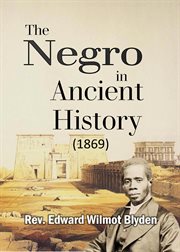Nonfiction
eBook
Details
PUBLISHED
Made available through hoopla
DESCRIPTION
1 online resource
ISBN/ISSN
LANGUAGE
NOTES
"Established that the ancestors of today's Negroes were the same who constructed the Tower of Babel." - Nationalism in Asia and Africa (2013) "Without doubt, Blyden was the most learned man of the race." -National Cyclopedia of the Colored Race (1919) "Blyden does not shy away from stating that the ancient Egyptians and Ethiopians were indeed black." Edward Wilmot Blyden and the Racial Nationalist Imagination (2012) "Blyden has enjoyed hero status in the hands of historians of the nineteenth century African educated elite." - African Historical Studies (2005) "The most serious attempt made by a member of the Negro race to reconstruct aspects of early Negro history." - Edward Wilmot Blyden: Pan-Negro Patriot (1970) "The major pan-Negro spokesman of the nineteenth." - Political Science Papers (1969) "You who do not know anything of your history will do well to read the works of Blyden...has done much to retrieve the lost prestige of the race." -Marcus Garvey "Blyden's arguments about the racial identity of the ancient Egyptians had filtered down and become well established for some African Americans." - Akhenaten: History, Fantasy and Ancient Egypt (2002) A major spokesman for the pan-African movement who was highly regarded for his great intellect, Edward Blyden (1832 -1912) was born in St. Thomas, West Indies, then lived in the United States as a youth before moving to Liberia in 1851. His writings on pan-Africanism were influential in both Liberia and Sierra Leone where he taught for five years. These colonies were founded during the slavery years for the resettlement of free blacks from Great Britain and the United States. In 1869, Blyden published "The Negro in Ancient History," a short 25-page work with the goal "that the eyes of the blacks may be opened to discern their true mission and destiny; that, making their escape from the house of bondage, they may betake themselves to their ancestral home , and assist in constructing a Christian African empire." Blyden argues that "as descendants of Ham had a share, as the most prominent actors on the scene, in the founding of cities and in the organization of government, so members of the same family, developed under different circumstances, will have an important part in the closing of the great drama." Drawing the parallel between the slavery of the Israelites and African-Americans, Blyden writes: "When we notice the scornful indifference with which the Negro is spoken of by certain politicians in America, we fancy that the attitude of Pharaoh and the aristocratic Egyptians must have been precisely similar toward the Jews. We fancy we see one of the magicians in council, after the first visit of Moses demanding the release of the Israelites, rising up with indignation and pouring out a torrent of scornful invective such as any rabid anti-Negro politician might now indulge in."
Mode of access: World Wide Web







